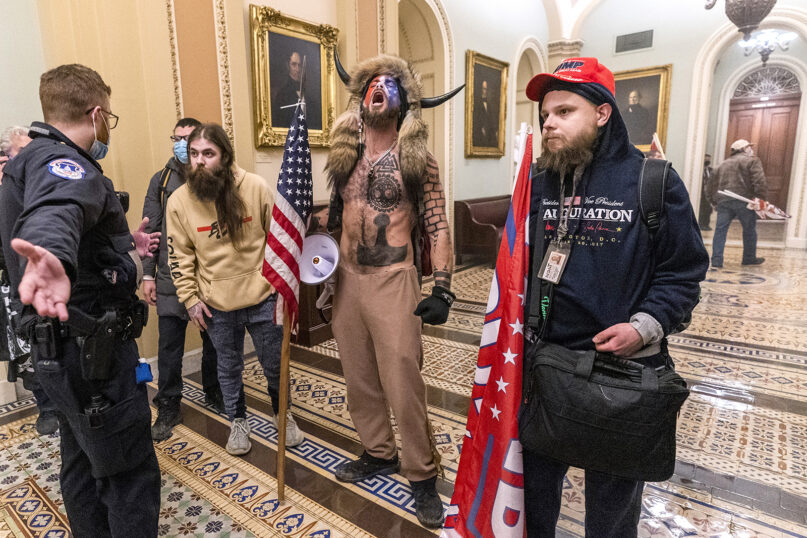(RNS) — Moments after an insurrectionist carried the Christian flag into the U.S. Senate chamber on Jan. 6, 2021, Jacob Chansley (the “QAnon Shaman”) led the intruders in a prayer.
Thank you heavenly Father for being the inspiration needed to these police officers to allow us into the building; to allow us to exercise our rights; to allow us to send a message to all the tyrants, the communists, and the globalists, that this is our nation, not theirs. … Thank you for allowing the United States to be reborn. … In Christ’s holy name we pray! Amen.
It may be tempting to dismiss a man in a fur hat with horns, but it is just one of the dozens of examples of Christian nationalism that the Select Committee to Investigate the January 6th Attack on the United States Capitol must acknowledge and address in its upcoming hearings. We will not have a full picture of what happened on that day without a thorough accounting of how Christian nationalism united the various actors and intensified their attack.
Christian nationalism is a political ideology and cultural framework. It merges American and Christian identities, suggesting that only Christians are “true” Americans. This pervasive ideology not only undermines the ideal of religious freedom for all — which is foundational to our constitutional democracy — but also threatens core directives of Christianity: to worship only God and to love our neighbors as ourselves.
RELATED: Read RNS’ full coverage of Christian nationalism on Jan. 6
For these reasons, the organization that I lead, Baptist Joint Committee for Religious Liberty, has been speaking out against the dangers of Christian nationalism for years. We created the Christians Against Christian Nationalism campaign to give voice to additional opponents of this ideology. The campaign provides resources about Christian nationalism and how it distorts Christianity and harms our neighbors.
Earlier this year, BJC worked with secular partners at the Freedom From Religion Foundation to publish a comprehensive report on Christian nationalism and its role in the Jan. 6 attack. This project, which serves as a resource for lawmakers and the general public, includes the most complete record to date of how Christian nationalism helped fuel the insurrection.
Much like racism, Christian nationalism permeates our culture and impacts us all to varying degrees — I have yet to meet a person who self-identifies as a Christian nationalist. Dismantling Christian nationalism starts with questioning assumptions and myths that underlie common statements, like “America is a Christian nation.” We can affirm a productive role for religion — including but not limited to Christianity — in our public square without providing Christianity or Christians a place of privilege in our laws and policy.
The constitutional framers protected religious freedom by balancing two guarantees in the First Amendment: the free exercise of religion and the prohibition against its establishment by the government.
These values are being challenged in this election year by politicians and other leaders. Doug Mastriano, the GOP’s gubernatorial nominee in Pennsylvania, participated in the “Stop the Steal” rally on Jan. 6 and has been subpoenaed by the Select Committee. He also has repeatedly blended religion and government in his public speeches, saying at one point: “We’re going to bring the state back to righteousness, this is our day, our hour to take our state back and renew the blessings of America.”
This kind of language — harking back to some idealized “time in America” — is one way that racism and white supremacy become coded into Christian nationalism. Violent extremists, such as the insurrectionists at the Capitol and more recently the shooter at the Tops supermarket in Buffalo, use Christian language and symbols in conjunction with overtly racist rantings in attempts to cloak their actions in respectability and divine authority.
The Christianity they summon and the Jesus they imagine — a white, muscular figure who seeks and wields political power — is not only not present in the Gospels, it is refuted by the Gospels.
I will be watching the congressional hearings closely. I hope that the committee members will name instances of Christian nationalism and explore how that ideology inspired the violence. How did white supremacist groups such as the Proud Boys use the language of Christian nationalism to attract more support for their extreme views? How did political leaders such as President Donald Trump and Mark Meadows conflate religious authority with political authority in their communications?
RELATED: New report details the influence of Christian nationalism on the insurrection
In a rally the night before Jan. 6, Pastor Greg Locke prayed: “God is on our side. America is the last bastion of Christian freedom. It’s the last bastion of capitalism. … I declare unto you that President Donald Trump is gonna stay for four more years in the White House. … We’re a mighty army. They’ve gotta listen. They can’t ignore us.”
I agree with Locke: We cannot ignore what he and so many others are saying. We cannot turn away from the danger that Christian nationalism poses to our country. The upcoming hearings provide an opportunity for the public to see Christian nationalism for what it is: a clear and present danger to American democracy.
(Amanda Tyler is executive director of BJC (Baptist Joint Committee for Religious Liberty) and the lead organizer of Christians Against Christian Nationalism. The views expressed in this commentary do not necessarily reflect those of Religion News Service.)





